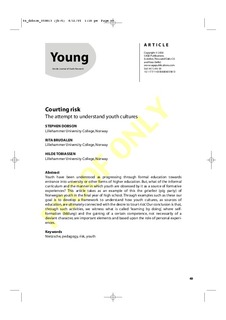Courting risk : the attempt to understand youth cultures
Journal article, Peer reviewed
Permanent lenke
http://hdl.handle.net/11250/144658Utgivelsesdato
2006Metadata
Vis full innførselSamlinger
Originalversjon
Dobson, S., Brudalen, R., & Tobiassen, H. (2006). Courting risk. Young, 14(1), 49-59. doi: 10.1177/1103308806059813Sammendrag
Youth have been understood as progressing through formal education towards entrance into university or other forms of higher education. But, what of the informal curriculum and the manner in which youth are obsessed by it as a source of formative experiences? This article takes as an example of this the grisefest (pig party) of Norwegian youth in the final year of high school. Through examples such as these our goal is to develop a framework to understand how youth cultures, as sources of education, are ultimately connected with the desire to ‘court risk’.Our conclusion is that, through such activities, we witness what is called ‘learning by doing’, where self-formation (bildung) and the gaining of a certain competence, not necessarily of a deviant character, are important elements and based upon the role of personal experiences. This article is a follow-up to our project, entitled Overcoming Nihilism Through Planned Normlessness. The Experience of Norwegian High School Youth (Dobson et al., 2003). We continue to develop our views based on Nietzsche’s pedagogy by focusing not upon nihilism, but risk. Accordingly, ‘risk’becomes an important additional category in our developing understanding of Nietzsche’s pedagogy.
